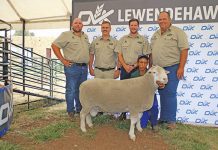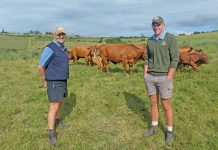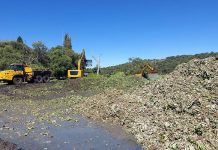Game ranchers often wonder why the Department of Environmental Affairs and Tourism (DEAT) wants to legislate against extralimital game but makes no public statement about the damage alien farm animals such as Angora goats inflict on the environment. Why the silence? Of course, the DEAT doesn’t have any say in the National Department of Agriculture (NDA). And the wool and mohair industries, for example, support thousands of jobs. Generally, nature conservationists are nervous about alien species because, whereas the movements of domesticated livestock can be controlled, the movements of alien wild animals can’t.
But sometimes conservationists take things to extremes and their reasoning becomes clouded by obsessions. Then they lose sight of what game ranching is all about. Sadly, some of the government’s so-called wildlife experts don’t think clearly about how or why game ranches exist, let alone what game ranchers are trying to achieve. These civil service “experts” appear to want to turn all ranches into pseudo-government nature reserves. The result is that ranchers are enduring massive bureaucratic interference from people who are complicating proper ranching management because many of their demands are irrational.
There’s a huge difference between the objectives of a national park and/or government nature reserve and the objectives of a game ranch. Cattle farming and game ranching simply have much more in common than have a national park and a game ranch. Trying to run ranches like nature reserves would kill the private ranching industry, which is why game ranchers would be much better off under the NDA than the DEAT. W hat must ranchers do to switch departments? Firstly, they have to recognise the implications of all wildlife management practices on their ranches. They must realise that the objectives of a game ranch are much more in line with the objectives of cattle ranching (conventional agriculture) than they are with DEAT objectives. And they must clearly understand that by allowing the DEAT to officially impose protected-area objectives on them, they are undermining their economic integrity. Then they must stand as a united group and demand to fall under the jurisdiction of the NDA and not the DEAT.
As in all wildlife utilisation systems, the people who know the most about game ranching are the game ranchers themselves. Instead of ruling ranchers with an iron fist, government should just allow the game ranchers to govern themselves by asking them to adhere to the principles and practices that best serve their industry. At the same time, South African nature lovers should be educated about the bigger conservation picture, and be made aware of the implications of short-sighted policies and strategies. Is current wildlife research relevant to game ranching? Ecology – the study of living organisms and their interactions with the environment – is the crux of good management, and without an appreciation of ecology no responsible or sensible management is possible. But when ecology is used as a smokescreen for other purposes, as often happens today, it prostitutes the profession. There are two kinds of research. Pure research gathers scientific knowledge and is used by many scientists to obtain advanced university degrees. Then there’s management-related research, which is used to solve wildlife (or domesticated animal) management problems. Both are justified, but their goals are often confused. Nature conservation scientists should be involved with management-related research only.
There are just too many management-related problems for them to indulge in pure research, which should be left primarily to university scientists. Of course, a great deal of management-related research is done by university scientists, too. But some academics are now fellow-travellers of the anti-hunting and anti-wildlife-use animal rights brigade. Funding for research is not easy to get, so when the International Fund for Animal Welfare (the biggest animal rights organisation in the world) offers a researcher money, he or she grabs it – including all the strings attached. This gives the animal rightists undeserved credibility, but compromises the scientist’s integrity. Contact Ron Thomson on [email protected].








